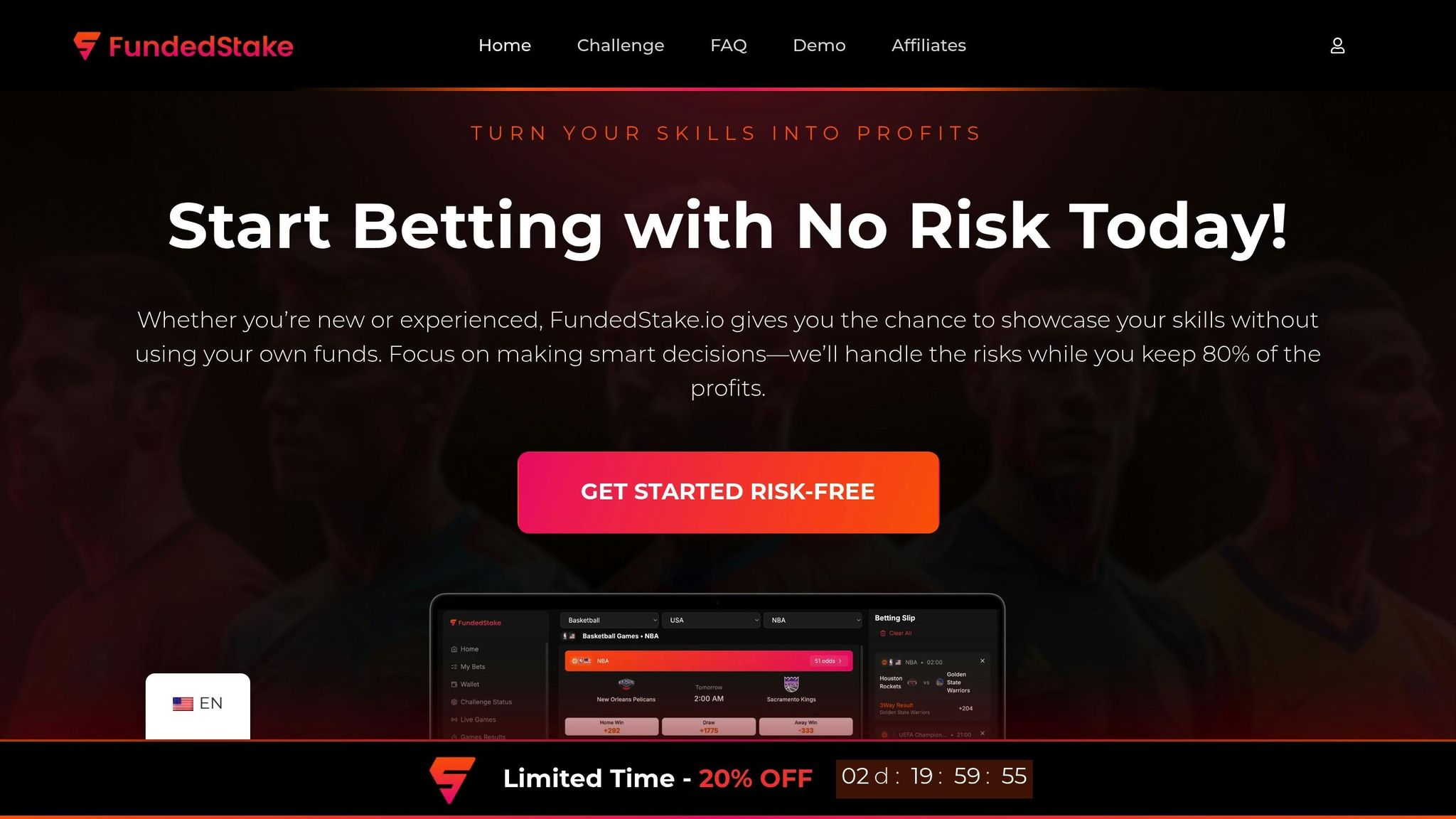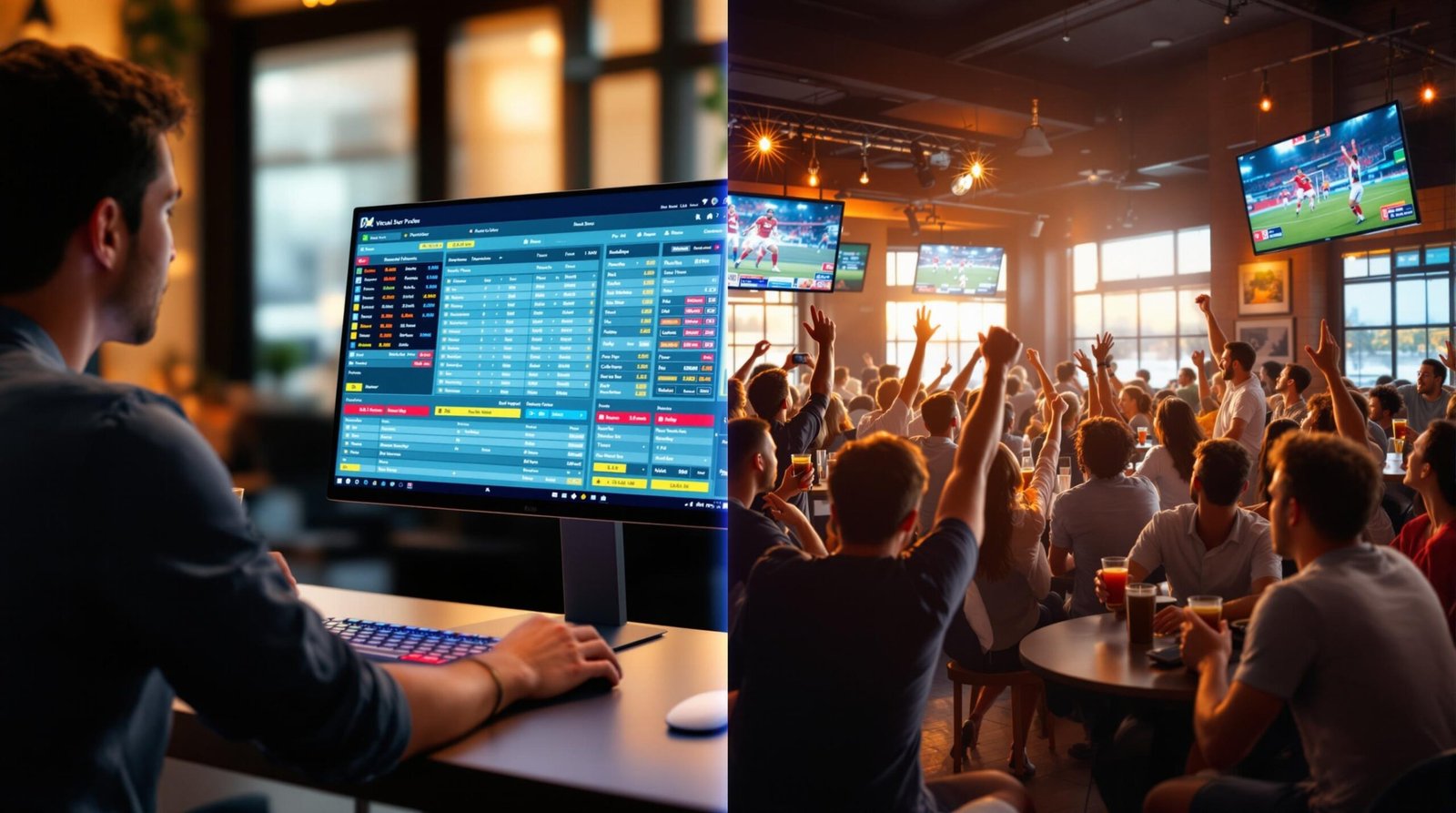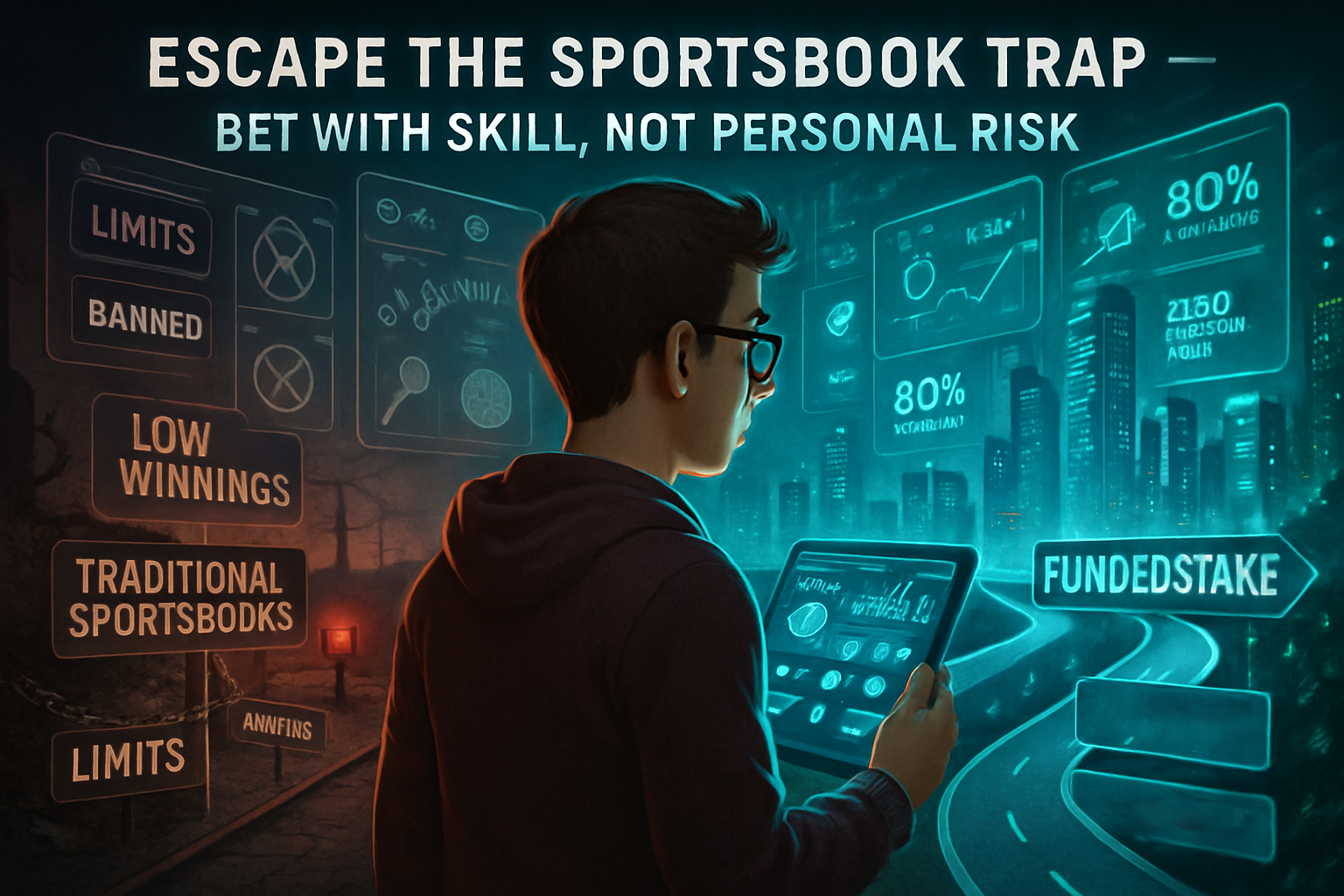Virtual and real money sports betting offer distinct experiences for bettors. Virtual betting involves simulated sports events using random number generators (RNG), available 24/7, making it ideal for practice with no financial risk. Real money betting, based on actual sports events, requires knowledge of sports, carries financial stakes, and offers the excitement of live outcomes. Here’s a quick comparison:
| Aspetto | Virtual Betting | Real Money Betting |
|---|---|---|
| Livello di rischio | No financial risk | Real money involved |
| Emotional Impact | Low-pressure, less stress | Higher stakes, more stress and excitement |
| Learning Value | Great for practice and skill-building | Requires applying sports expertise |
| Access | Broadly accessible, minimal restrictions | Regulated, depends on legal jurisdiction |
| Decision Making | Algorithm-based outcomes | Influenced by real-world factors |
Virtual betting is perfect for beginners to practice strategies, while real money betting is for those seeking higher stakes and real-world challenges. Both require discipline, risk management, and a clear strategy to succeed.
CORRECT SCORE BETTING | VIRTUAL BETTING | HOW TO …
Money and Risk Management
Understanding how finances play into virtual and real money sports betting is crucial. This section breaks down how each approach affects your exposure to risk.
Virtual Betting: A Risk-Free Learning Zone
Virtual betting offers a no-risk way to practice and gain experience. Many users turn to these platforms as training tools.
Take the Funded Stake platform, for example. It offers challenges ranging from $1,000 to $100,000 with preset risk limits. For instance, in the $5,000 Challenge, users face a daily loss cap of $750. This setup helps bettors build discipline and learn the ropes without putting their own money on the line.
Real Money Betting: The Stakes Are Real
Betting with real money introduces a whole new level of financial risk. As of January 2024, monthly wagers have skyrocketed to $14 billion, compared to just $1.1 billion in 2019. However, this rise in betting has had financial consequences. In states where sports betting is legal, credit scores have dropped, bankruptcies have increased by 28%, and debt collections have risen by 8%.
Comparing Risks
| Aspetto | Virtual Betting | Real Money Betting |
|---|---|---|
| Financial Risk | Nessuno | Average household bets up $1,100/year |
| Investment Impact | Nessuno | 14% drop in investments |
| Learning Cost | One-time fee | Continuous potential losses |
| Limiti di rischio | Preset by platform | Self-imposed |
| Recovery Options | Reset available | May require financial advice |
Chris Woods, a Certified Financial Planner, advises: "If people are going to do this, I would have them set up a budget, and put this as a line item in the budget. Treat it just as you would your other entertainment outings".
For those moving from virtual to real money betting, strict gestione del bankroll is crucial. This includes setting clear betting limits, avoiding the temptation to chase losses, and sticking to a consistent "bet to risk" strategy. These habits are especially important for beginners, helping to safeguard finances while honing profitable betting skills.
These insights offer a solid foundation for building disciplined strategies as you transition from practice to real stakes.
Mental Factors in Betting Decisions
The psychological effects of betting can differ greatly between virtual and real money formats, shaping how individuals make decisions and handle pressure. These mental aspects play a key role in distinguishing the two betting experiences.
Virtual Betting: Lower Emotional Stakes
Virtual betting offers a low-pressure setting where emotional stress is minimal. Since virtual capital is used, bettors can concentrate on honing strategies without the weight of financial consequences. The use of random number generators (RNG) in virtual sports betting ensures that outcomes are simulated, creating emotional distance. This setup allows bettors to:
- Analyze odds more objectively
- Experiment with strategies
- Learn from mistakes without financial loss
- Build disciplined betting habits
Real Money Betting: Navigating High Stakes
Real money betting, on the other hand, introduces financial risks that can heavily influence decisions. With 45% of sports betting now happening online, the ability to handle pressure is crucial. The National Council on Problem Gaming highlights:
"Recent research suggests that gambling problems may increase as sports gambling grows explosively at the same time that mobile and online technologies evolve to create seemingly unlimited types of wagering opportunities."
| Emotional Factor | Effect on Decision Making | Livello di rischio |
|---|---|---|
| Financial Stress | Leads to chasing losses | Alto |
| Pressione temporale | Encourages rushed decisions | Medio |
| Results Anxiety | Makes it harder to stick to plans | Alto |
| FOMO (Fear of Missing Out) | Causes overextending beyond limits | Medio |
Comparing Mental Effects
The psychological contrasts between virtual and real money betting highlight unique behavioral tendencies. Research shows that sports bettors are twice as likely to face gambling problems compared to general gamblers, emphasizing the intense stress tied to real money stakes.
Virtual betting environments, with their structured risk limitations, help users develop emotional resilience while practicing larger bets. This serves as a transition point for improving performance in real money situations. Younger bettors are particularly at risk, with studies revealing that 75% of students participated in gambling activities as of 2018.
sbb-itb-6ef1185
Access and Rules by Region
The rules and availability of virtual and real money sports betting differ widely depending on the region, leading to varied experiences for users.
Virtual Betting: Broad Accessibility
Virtual betting platforms are generally easier to access, focusing on skill-building and learning. For instance, platforms like Funded Stake offer virtual challenges that bypass many geographical restrictions.
Some key features of virtual betting include:
- No strict age verification
- Few geographical limitations
- Simple registration process
- Instant access to platforms
Real Money Betting: Legal Considerations
As of March 2025, U.S. sports betting regulations reveal the following:
- 38 states and Washington D.C. allow sports betting
- 29 states permit online and mobile betting
- 11 states, including California and Texas, maintain complete bans
Here are some examples of state-specific rules:
| State | Betting Format | Key Restrictions |
|---|---|---|
| Arizona | Retail & Online | Requires partnerships with tribal casinos |
| Tennessee | Mobile Only | No retail betting locations available |
These legal frameworks highlight the need for careful compliance and risk management in real money betting.
Comparing Access Rules
The global sports betting market shows clear regional differences. In 2021, revenue figures included:
- $4.33 billion in the U.S.
- $5.4 billion in the U.K.
- $21 billion in the Asia Pacific region
| Aspetto | Virtual Betting | Real Money Betting |
|---|---|---|
| Age Verification | Basic | Strict KYC requirements |
| Location Requirements | Minimal | Enforced geofencing |
| Payment Processing | Educational purposes | Heavily regulated |
| Registration Process | Quick and simple | Multiple verifications |
| Market Access | Global availability | Dependent on jurisdiction |
These differences explain why many bettors start with virtual platforms to develop their skills before transitioning to real money betting.
Building Betting Skills
Virtual Betting: A Risk-Free Training Ground
Virtual betting offers a no-risk way to hone your betting skills. Through virtual sports simulations, you can practice key concepts without putting real money on the line. Some of the skills you can develop include:
- Understanding odds and assessing probabilities
- Managing your bankroll effectively
- Choosing the right markets for your bets
Unlike real soccer matches that last around 90 minutes, virtual matches are much shorter – typically 3–5 minutes. This allows for faster practice sessions and quicker learning.
Real Money Betting: Putting Skills to the Test
When moving to real money betting, it’s crucial to apply your skills in real-world scenarios. Platforms like Funded Stake provide a structured way to ease into this transition. They offer virtual capital and set clear risk limits, helping you build disciplined habits. For example, their progressive challenges include:
| Livello di sfida | Capitale virtuale | Perdita massima giornaliera | Obiettivo di profitto |
|---|---|---|---|
| Ingresso | $1,000 | $150 | 33% |
| Intermedio | $5,000 | $750 | 33% |
| Avanzato | $10,000 | $1,500 | 33% |
These challenges serve as a bridge between theory and real-world betting, creating a clear path for improving your skills.
Strengthening Betting Strategies
Combining virtual betting with structured real-money challenges helps reinforce disciplined strategies. Virtual betting, with its simulated outcomes, aids in understanding probabilities, while the faster cycles allow for quick testing of different approaches. This makes it an excellent environment for experimenting with various strategies.
A great example is the Virtual Grand National, which has shown results closely aligned with actual race outcomes. This highlights how virtual platforms can mimic real betting scenarios while offering a safe space to learn.
To get the most out of your skill-building journey, focus on these steps:
- Start with simple bets on virtual platforms to master the basics.
- Set strict loss limits to manage your risk.
- Analyze markets to spot the most promising opportunities.
- Track your performance and tweak strategies based on results.
This methodical approach helps you transition smoothly from virtual betting to real-money wagering while encouraging responsible gambling habits.
Moving from Virtual to Real Money
Once you’ve honed your skills, stepping into real money betting requires careful planning and a steady approach.
Come Quota finanziata Helps

Funded Stake provides a structured path to move from practice to real money betting. The platform gives you virtual capital ranging from $1,000 to $100,000, allowing you to refine your strategies without financial risk. Each challenge comes with profit targets and risk management rules designed to reflect real-life betting conditions.
The process is split into two phases, helping you transition smoothly:
| Fase | Durata | Requisiti | Risk Controls |
|---|---|---|---|
| Sfida | 30 giorni | At least 25 picks, 33% profit target | Daily loss limits, maximum drawdown |
| Verifica | Ongoing | Consistent performance | 80% profit share, bi-weekly payouts |
Steps for a Smooth Transition
Here’s how to move safely from practice to real money betting:
-
Focus on Risk Management
Keep detailed records of your bets, monitor your position sizes, and set clear loss limits as you transition. -
Develop a Betting Plan
Define your entry and exit points, establish rules for position sizing, and create a system for tracking your performance. -
Test with Smaller Stakes
Start with the $1,000 challenge, stick to consistent position sizes (1-3%), and bet on sports or markets you know well.
Tools to Support Your Transition
Funded Stake equips you with tools to make the shift easier:
- Performance Analytics: Review your betting history, win rates, and profit/loss stats.
- Risk Management Dashboard: Keep an eye on daily loss limits and drawdowns.
- Community Access: Join the Discordia group to share strategies and learn from others.
- Verification System: A KYC process ensures compliance with legal standards.
These tools help you stay disciplined. The bi-weekly withdrawal schedule encourages better bankroll management and reduces impulsive decisions.
Start with smaller challenges to build confidence and refine your strategy before moving to higher stakes. This approach reinforces the risk and skill management techniques you’ve already practiced.
Sintesi
Virtual and real-money sports betting cater to different needs. Virtual betting offers a no-risk space for beginners to practice and improve their skills, while real-money betting brings actual stakes and a more intense emotional experience.
The main distinction lies in the stakes. Real-money betting requires careful discipline and oversight, with regulations in place to manage risks. Here’s a quick comparison of some key aspects:
| Aspetto | Virtual Betting | Real Money Betting |
|---|---|---|
| Livello di rischio | No financial risk | Real money involved |
| Emotional Impact | Less pressure | More stress and excitement |
| Market Access | Easily accessible | Depends on legal regulations |
| Learning Value | Great for practice | Offers real-world insights |
| Decision Making | Algorithm-based outcomes | Tied to real sports events |
Both formats require solid risk management strategies. Virtual betting relies on simulated players and teams, while real-money betting demands a thorough understanding of actual sports events and market dynamics. As the sports betting world evolves, virtual platforms are becoming increasingly popular for their ease of access and educational value.
To excel in either type, a disciplined approach and clear strategy are essential.
Messaggi correlati
- 7 consigli essenziali per una strategia di scommesse sportive redditizia
- La gestione del rischio nelle scommesse sportive: 5 principi chiave
- Gestione del rischio delle scommesse sportive 101: proteggere il proprio bankroll e i propri profitti
- 5 consigli per evitare la sovraesposizione nelle scommesse singole



